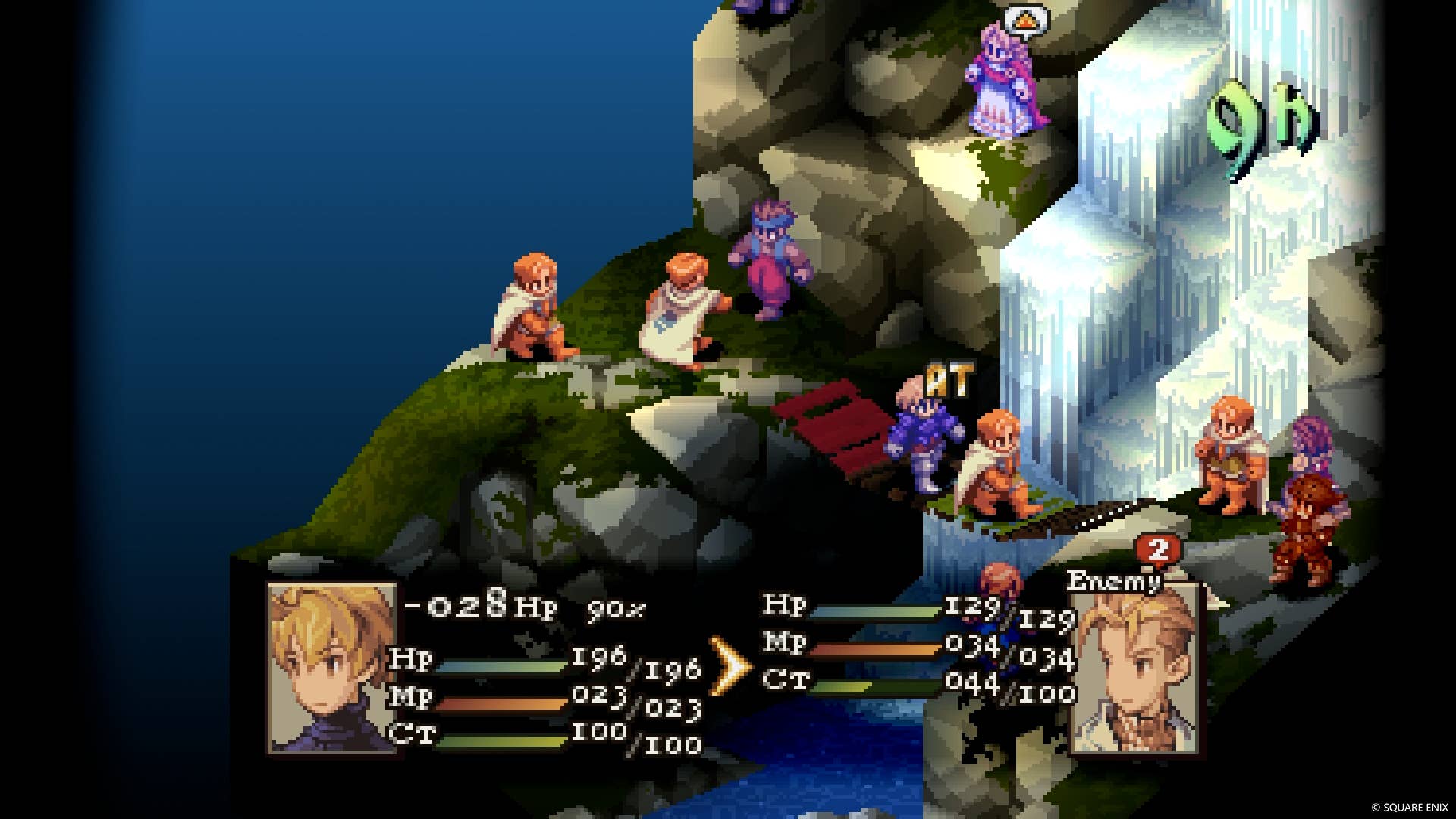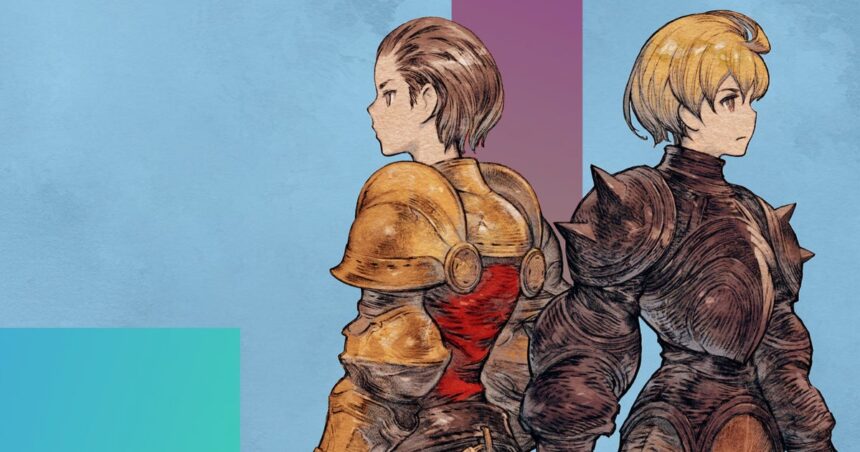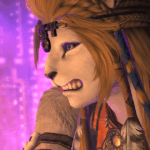There’s something special about Final Fantasy Tactics. It’s one of those games where it’s difficult to ascertain and harder to elucidate, but it just has… something. An X-Factor. A je ne sais quoi. I have vaguely fond memories of the game in general, but sitting down to play just 45 minutes of upcoming remaster The Ivalice Chronicles, it doesn’t take long for that secret sauce to sink its claws into me. I should play this whole thing, I think. I hadn’t really planned to play it in full again. But 45 minutes later, there I was – mentally rejigging my October weekend plans.
The key developers behind the remaster know what I mean. Both were too young to play a major role in the original version of the game, but both inherently understand. Remaster co-director Ayako Yokoyama wasn’t in the industry when the original arrived in 1997, while director Kazutoyo Maehiro was directly involved in the original, but only on a small piece of side content that actually wasn’t included in the English-language version.
To see this content please enable targeting cookies.
Fresh off work on Final Fantasy 16, which Square Enix public relations gurus strangely marked out as an off-limits topic of conversation in our sit-down, the two are now tasked with stewarding this remaster. Despite it being unmentionable, putting folk from FF16 onto Tactics makes an enormous amount of sense: the earthy tone of FF16 owes as much to the tales of the land of Ivalice as it does to Game of Thrones, to which it was more oft-compared. And in many ways, Final Fantasy Tactics’ hard-headed, heavy-hitting narrative lands better now than it did in 1997 – be that because of the serious issue of wild inequity in the world, paralleling Ivalice, or the more whimsical surging public interest in starchy medieval fantasy.
“Obviously, this game came out 28 years ago,” says co-director Ayako Yokoyama. “But the story is amazing, and I think that’s something we want people to experience. At the same time it is a strategy RPG, and maybe for more casual players that’s a little bit of a hurdle. It can even be hard for people who aren’t used to that type of game, but do like story-based RPGs.”
This, in a sense, is thesis enough for the existence of the remake. The story is, indeed, bloody brilliant. Clearly the narrative, concocted by the legendary Yasumi Matsuno, is a part of that secret sauce I mentioned earlier. Though it certainly is also more than that – which makes the task of a remaster, intended to preserve the original and widen the audience, a more challenging one.
The attempt to thread this needle is fascinating; not quite remake, not quite remaster, built from the ground-up due to a loss of source code, this is a do-over that wants to absolutely present the same game, but carefully tweak the offering in an attempt to find wider success. This is not an easy thing to do, and it’s surely true that more than just beautified visuals (which are present) will be required.
It follows the Square Enix trend of being definitive but not, featuring most of the content from the various previous versions of FFT, but eschewing some in order to present a more ‘pure’ vision of the original. Later-added crossovers and tie-ins with Final Fantasy 12 and Tactics Advance are deleted, for instance – the focus is on the original game, in part because as Yokoyama suggests, there’s a strong belief that it was a particularly strong and special moment of time.
Early on in the development of The Ivalice Chronicles Square Enix identified difficulty as a sticking point, though. Even though we now live in a world where more challenging games are revered, there was a feeling that things had to change for Tactics.
“I think when it comes to the game, the game elements itself, and difficulty in general terms I think the difficulty of games back in the day and the difficulty that has become more popular today, like FromSoftware style – that’s a little bit different,” muses director Kazutoyo Maehiro.
The result of this line of thought has been to completely rethink and rebalance the game, resulting in three different difficulty options. Squire is the equivalent of ‘easy’, and is more straightforward than any version of FFT to date. “28 years ago I think there were even people who might’ve played the very first battle and stopped right there – so we’ve really made the Squire difficulty more for those people who just want to focus on the story,” Yokoyama explains.
Then there’s Knight. Yokoyama describes this middle-of-the-road option as “a little bit easier” than the original game that has been “toned down just a bit”. And then for the real sickos old enough to remember the original there’s Tactician difficulty, perfect for those who want the pain of the OG – if their back problems aren’t painful enough for them.
Like I say, playing just a small slice of the game’s first few hours is enough to convince me of the need for a remaster. Not so much to fix anything – I am one of the aged back-pain freaks that enjoyed the original’s bite – but more to ensure a larger audience can experience this title.

I really, really like Final Fantasy Tactics Advance (I am team Marche did nothing wrong, for the record), but even I must admit that there is something special about FFT that hasn’t been captured by subsequent FF Tactics games, or even by the strategy RPG genre at large. I just love so much of it – the story’s lower-stakes nature, driven by personal feuds and pettiness. The way characters’ little sprites walk in place while waiting orders. The raw simplicity of its battles, which is something of a contradiction because its combat is also mechanically rich. You can see how this game was seminal, instrumental in inspiring everything from Disgaea to Fallout Tactics.
“When the original version came out 28 years ago, this was made by Matsuno-san, who was obviously the game designer and the director behind it, but I think both thanks to his hard work and then also the the praise that it had received, it really did become one of those like standards,” says Maehiro. Matsuno is undoubtedly one of the true architects of the strategy RPG genre, and FFT is arguably his most important work. “It’s a classic title for the genre.”
Maehiro notes that he is himself a strategy RPG fan, and we have a brief laughing connection over both being down bad for super-hard difficulty stuff. When I mention FFT’s role in inspiring successors, he talks about clearing games like Fallout Tactics. This remaster releases into a different world – one where the genre has seen a tremendous resurgence elsewhere, including in an explosion of popularity of Nintendo’s Fire Emblem and tactical spin-offs from other franchises like Persona. The fact the original FFT remains relevant after so much genre progression and growth is telling.
But as a fan, Maehiro can also acknowledge a problem, though: “I think that overall the genre isn’t really a major genre in terms of the overall game industry.”
.png?width=1920&height=1920&fit=bounds&quality=70&format=jpg&auto=webp)
We come back around to growing the audience, which in turn brings us full circle to that crucial difficulty rebalancing. “It was simple – we want to take that game, and we want to provide that experience to as many people as we can.”
The work done here may well be enough to carry the story and world of Final Fantasy Tactics to a decent number of new players. There’s wrinkles in this new presentation, of course. The voicework is excellent, but there’s a strange dichotomy to a game built for text with voicework crowbared in. No matter how brilliantly those actors perform, the pacing of mid-combat chatter in particular feels to slow to a crawl if you wait for the voiceover to finish. But then the translation itself is impeccably improved – and with bravery, too. One of the most famous lines in Final Fantasy history, “Blame yourself or god,” has been rewritten again – giving us a halfway point between the iconic original and the more flowery interpretation of the PSP localization.
The one major new addition to the game this time around is ‘State of the Realm’, a feature drafted in from FF16. This is a brilliant codex-like feature that lives and breathes alongside the world – as the game state changes, so too does this tome of knowledge. Yokoyama says this is her favourite addition, even though it was “very hard” to implement. I didn’t play enough of The Ivalice Chronicles to truly see this, but if it’s anything like the FF16 implementation it should be a great addition to a game which has a story filled with nuance and ever-changing character loyalties.
In the end, this is looking like a strong new version of a total stone-cold classic. It seems more accessible, more visually appealing, and about as definitive as a Square Enix re-release gets, as this publisher always seems reluctant to include all content in any single version, as shown by the strange laundry list of cut content from the otherwise-absolute FF Pixel Remasters. It’s doing exactly what I really needed and wanted a new version of Final Fantasy Tactics to do.
As Maehiro knowingly notes, this is certainly a more niche genre. Strategy RPG fans are a passionate bunch, though – and with this streamlined and accessible release, Square Enix might just be able to swell their ranks.





